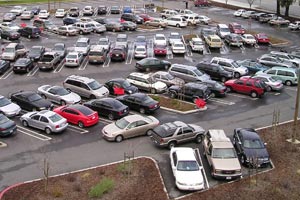
Image courtesy Wikimedia Commons
Four states around the Great Lakes have an average of 2.5 parking-lot spaces per car, and that doesn’t even include parking structures or spots on the street, a new study finds. Purdue University researchers who surveyed Indiana, Michigan, Illinois, and Wisconsin found that parking lots take up an incredible 5 percent of urban land in those states.
To people who regularly waste entire weekend mornings looking for parking (like many of us in the Bay Area do), this doesn’t sound so bad. But parking lots take a toll on the environment: By contributing to the urban heat island effect, parking lots can make cities hotter. They can conduct toxic runoff into streams and lakes, leading to poor water quality. They can also raise the temperature of waterways, which is bad news for plants and animals whose survival depends on cool enough water.
Discovery News interviewed UCLA parking expert Donald Shoup about how to solve this problem:
“Parking is so heavily regulated in terms of minimum spaces,” said Shoup. Typically city or county regulations require a certain minimum number of spaces per square feet of floor space of business. The type of business matters too.
Restaurants, for instance, require more space than an accountant’s office. But it’s a minimum, not a maximum number of spaces, and there is a tendency for businesses to lean towards more spaces, since no one wants to lose a customer because of lack of parking.
As a result, cities have no way of knowing how many parking spaces there are, Shoup said.
Several things can be done, however, to keep parking lots from taking over, he said. One is to set maximums for parking spaces. Another is to allow businesses and residential areas to share parking areas, so that a bank, for instance, uses the parking during the day and a bar uses it at night.
Street parking obviously makes use of already-existing paved areas, but there’s not enough of it in most cities, and endless driving around searching for a spot wastes gas and creates carbon emissions. One solution: this phone app, which shows you the nearest available parking spaces. Any other parking-lot proliferation solutions you can think of, readers?













